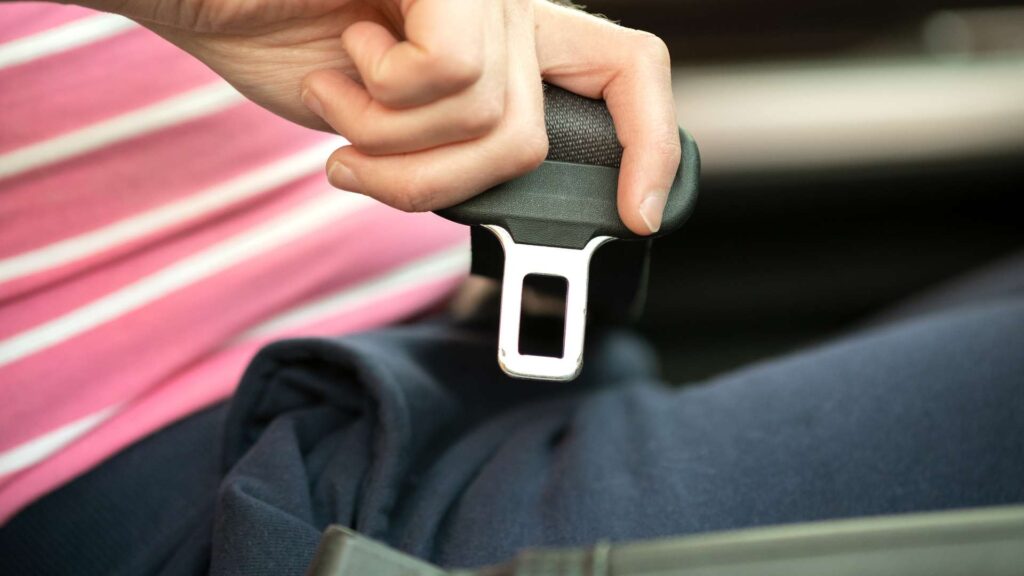Georgia, like most states, prioritizes the safety of its drivers and passengers. One crucial element of this focus is the seatbelt law. While wearing a seatbelt is a no-brainer for safety, understanding the legal implications surrounding seatbelts and car accident claims in Georgia can be complex. This blog explores the details of Georgia’s seatbelt laws and their impact on car accident claims.
Georgia Seatbelt Law: The Basics
Georgia 40-8-76.1 mandates seatbelt use for all drivers and front-seat passengers in passenger vehicles. This includes cars, trucks, vans, and SUVs. The law requires occupants to wear a properly adjusted seatbelt that meets federal safety standards.
Here’s a breakdown of the specific requirements:
- Drivers: Must wear a seatbelt at all times while operating the vehicle.
- Front-Seat Passengers (Age 16 and Over): Required to wear a seatbelt whenever the vehicle is in motion.
There are some exceptions to this law, including:
- Passengers under 16: Children under 16 must be properly restrained in an appropriate child safety seat or booster seat based on their age, weight, and height.
- Medical Exemptions: Individuals with a documented medical condition that prevents seatbelt use can obtain a doctor’s exemption.
- Rural Mail Carriers: Under specific circumstances, rural mail carriers delivering mail may be exempt.
Seatbelt Law Violations and Penalties
Failure to wear a seatbelt in Georgia is considered a primary offense. This means law enforcement can pull you over solely for not wearing a seatbelt. A violation can result in:
- Fines: The base fine for a seatbelt violation is $25. However, additional court fees and surcharges can significantly increase the total cost.
- Points: A seatbelt violation does not carry any points on your driver’s license.
While points might not be a concern, the financial penalty can add up. More importantly, not wearing a seatbelt significantly increases your risk of serious injury or death in an accident.
Seatbelts and Car Accident Claims in Georgia
Now, let’s explore how seatbelt use (or non-use) factors into car accident claims in Georgia. Here, we enter the realm of comparative negligence, a legal principle that applies to most car accident cases in the state.
Comparative Negligence Explained
Georgia is a modified comparative negligence state. This means that the fault for an accident is shared among the involved parties based on their respective contributions to the collision. Your compensation in a car accident claim will be reduced by the percentage of fault attributed to you.
For instance, if you’re deemed 20% at fault for the accident, your total compensation will be reduced by 20%.
Seatbelt Use and Comparative Negligence
Here’s where things get interesting. Georgia’s seatbelt law specifically prohibits the use of seatbelt non-use as evidence of negligence. This means the at-fault driver’s insurance company cannot argue that your injuries would have been less severe if you had been wearing a seatbelt. They cannot use this argument to reduce the amount of compensation they owe you.
The “Seatbelt Defense” and Its Limitations
While the law prevents the at-fault party from directly blaming your injuries on not wearing a seatbelt, there’s a caveat. The insurance company might introduce evidence suggesting your injuries could have been mitigated if you were buckled up. This is not to establish fault but to potentially argue for a lower compensation amount due to “avoidable injuries.”
However, Georgia courts strictly scrutinize such arguments. The burden of proof lies entirely with the insurance company to demonstrate a clear connection between not wearing a seatbelt and the specific nature of your injuries. This can be a difficult feat for them to achieve.
What This Means for Your Car Accident Claim
Here’s the takeaway:
- Not wearing a seatbelt cannot be used to establish fault in a car accident claim.
- The at-fault party’s insurance company might still try to argue for reduced compensation due to potential mitigation of injuries with a seatbelt.
- The success of this argument hinges on the insurance company providing substantial evidence of a direct link between your injuries and not wearing a seatbelt.

Additional Considerations
While Georgia law protects your right to full compensation regardless of seatbelt use in an accident you didn’t cause, it’s important to remember:
- Seatbelts Save Lives: This is an undeniable fact. Wearing a seatbelt is your best defense against serious injury or death in a car crash.
- Documentation is Key: Following an accident, gather as much evidence as possible, including medical records detailing your injuries. This documentation strengthens your claim and helps counter any arguments about potential mitigation of injuries.
- Severity of Injuries: The severity of your injuries can also influence the impact of not wearing a seatbelt. In cases of catastrophic injuries, the argument of “avoidable injuries” becomes less relevant.
- Seek Legal Counsel: Car accident claims, especially those involving seatbelt use, can be complex. Consulting with an experienced personal injury lawyer at Rebecca Kay Sapp Law Firm crucial. They can advise you on your rights, navigate the legal process, and ensure you receive the maximum compensation you deserve.
Strategies for Strengthening Your Car Accident Claim (Even if You Weren’t Wearing a Seatbelt)
While Georgia law protects your right to compensation, taking proactive steps can further strengthen your claim:
- Gather Evidence: Collect police reports, witness statements, photographs of the accident scene and your injuries (if possible), and any other relevant documentation.
- Maintain Detailed Records: Keep a record of all medical bills, treatment plans, and lost wages associated with the accident.
- Be Transparent with Your Lawyer: Provide your lawyer with a complete and honest account of the accident, including your injuries and whether you were wearing a seatbelt.
- Focus on Your Injuries: The focus of your claim should be on the severity of your injuries and the impact they have on your life.
The Importance of Wearing a Seatbelt: Beyond Legal Issues
While this blog has focused on the legal implications of seatbelt use, it’s crucial to remember the most important reason to buckle up: safety. Seatbelts are the single most effective way to prevent serious injury or death in a car accident. According to the Centers for Disease Control and Prevention (CDC), seatbelt use reduces the risk of fatal injury for drivers and front-seat passengers by 45% and the risk of serious injury by 60% https://www.cdc.gov/seat-belts/about/index.html.
Making Seatbelt Use a Habit
By developing the habit of buckling up every time you get into a car, you significantly increase your chances of walking away from an accident unharmed.
Spreading Seatbelt Awareness
Encourage your friends, family, and passengers to wear their seatbelts as well. Together, we can create a culture of road safety in Georgia.
Conclusion
Georgia’s seatbelt law protects your right to compensation after a car accident, regardless of whether you were wearing a seatbelt. However, the legal landscape can be complex. Consulting with a lawyer experienced in car accident claims is highly recommended. Remember, the best defense against injury is wearing a seatbelt every ride. Let’s all buckle up and prioritize safety on Georgia’s roads.

